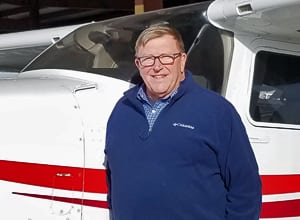Jeff Hartig - Chief Flight Instructor
Western Air Flight Academy - KBJC
| Flight Instructor: |
CFI, CFII, MEI |
| Certificates Held: |
Commercial Single Engine Land, Commercial Multi Engine Land, Instrument Rated |
| Education: |
Bachelor’s degree in Chemistry and Physics from Arizona State, Master’s degree in School Administration |
Jeff’s introduction to flying came in 1966 when he first flew in a Cessna 172 at sunrise over Phoenix Arizona. He then discovered an Aviation Explorer Post at Deer Valley Airport, where he learned more about flying and pursued his Private Pilot license. He received his Private Pilot license in 1972 at Scottsdale Airport, and then shortly after graduating from college, went to Air Force Pilot training. He spent 21 years as a copilot, first pilot, instructor pilot and evaluator pilot in the B-52. He then became a high school physics teacher for 23 years, flying Civil Air Patrol aircraft in his spare time. After retiring from teaching, he became a civilian flight instructor. He loves inspiring the same passion for aviation that he got in that first flight at sunrise over Phoenix. His son followed him into the Air Force and is currently a KC-135 Instructor Pilot at Fairchild AFB in Spokane WA.
5 useful questions to ask an instructor:
Why did you become a flight instructor?
Regardless of the answer, the way an instructor talks about why they fly is what is important. Look for
someone that is excited by teaching. They should have a genuine interest in giving others the gift of flight.
How long have you been flight instructing?
Some Instructors have thousands of hours under their belts and have been flight instructing for their entire
careers. Others have a few hundred and are just beginning. A seasoned instructor will have a lot of experience
but may have a set teaching style. A freshly minted instructor has less aircraft time but is able to relate to
common learning obstacles, having undergone their own flight training in the not too distant past. There are
advantages to both types of instructor.
How do you keep track of your student’s progress?
Using a syllabus is essential so that both student and instructor can track progress and milestones so make
sure your instructor uses one. Talk to other students and ask them what kind of reading their doing, what
books they’re using and the type of homework they’re getting. There should ALWAYS have some type of “homework”
assignment at the end of each lesson.
What is your availability?
Some instructors are part-time and work separate jobs during the week. Others are full-time, but may want to
have personal and family time on the weekends. Find an instructor with compatible availability. Flying at least
twice a week is the best way to progress quickly through accomplishments with less effort and less overall costs.
Choosing an instructor that is able to fly on the same schedule helps to keep flight training on a consistent path.
I’ve heard people talk about “stalling an airplane.” Can you tell me what it means?
This is a classic question. Regardless of knowing what an “aircraft stall” is or not, how an instructor explains
this concept will give great insight into how they can explain concepts. Are they patient? Do they use simple
terminology that is easy to understand? Do they ask questions to make sure their student understands, or do they
over simplify to brush off the question? Find an instructor whose instructing style is a good match.

